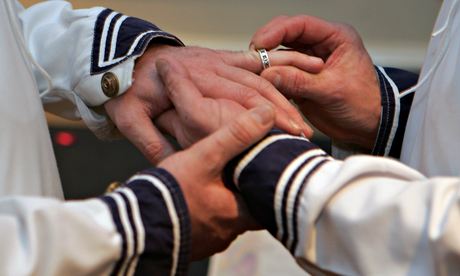
Homosexuality has only been legalised within my lifetime in the UK. This weekend the first equal marriages take place. The question "but why do you want it?" hasn't gone away just yet. And nor has the pseudo-helpful comment, "Well, if I was gay, I wouldn't want to get married anyway". Someone of my age, nearly 50, has been subjected all his life to the promise that you wouldn't want this or that particular freedom. You're better off without it.
First there was school. No, you're not really a sporty type, are you? Well, I didn't care much about that one. Football wasn't really for me, so I stood at the back of the field gossiping with the ones the sports master called "the mothers' union" or, in worse mood, "backline bummers". Might there be boys like us who wanted to be good at football? It didn't really cross our minds.
And then, later, it became apparent that we weren't going to be allowed into the army or the navy. Well, who cared about that? There were gay men and lesbians who might – I certainly knew one, in the sixth form. But rules were rules.
Closer to home, there were rules that had a more specific application. The law dictated that we weren't supposed to go to bed with anyone until five years after heterosexuals. The years between 16 and 21 were supposed to be years of thoughtful chastity. Yeah, right. Lesbians had it more easily; there was no age of consent at all for them. You couldn't help concluding that the law hadn't really thought about us at any point.
You weren't going to get married, obviously. I knew a few people who got married to foreigners for visas, never imagining they might want the right for themselves. When I left university and got a job in the public service, it was made clear that you could not apply for the Foreign Office. It didn't matter if you were openly gay or closeted; you were still regarded as a blackmail risk. I remember asking a distinguished public servant I met over the dinner table, just before my final interview for the job, whether I should ask directly if being homosexual was likely to limit my career prospects in the future. "No," he said, flickering with mild distaste. "I wouldn't bring that up." So I went back into the closet, briefly.
For a long time we didn't think much about the future. If, as a gay man, you came of age in the mid-1980s, it's fair to say that you didn't know what would happen to you, or your best friends, in the next 10 years. Law and Aids combined and made adopting an impossibility. Lesbians created new ideas of good families. But perhaps some gay men felt they shouldn't adopt in order to create an orphan. They looked for fulfilment elsewhere.
But however long the future was going to last, some people were always going to want to make a bond. The rest of the world was probably going to go on regarding our relationships as second rate, or temporary. Every gay or lesbian person knows what it's like to be invited out, leaving the uninvited partner at home, to be greeted by a table-full of other people's wives and husbands. In the early 1990s, the brother-in-law of my boyfriend of seven years, a Sicilian, seriously offered me money to stop coming to Sicily, and was genuinely surprised when I preferred my boyfriend to the cash.
The law changed, and we could sign up as civil partners. I got married to Zaved in 2009 – that's what we always say, since the verb "to civil-partner" seems designed to make it impossible to speak. Not everyone accepts the synonym. I had an acrimonious conversation with a nurse in hospital: every time I said "my husband", she corrected me and said "your partner". It seemed hilarious to the equality representative at Exeter University, where I used to teach, that I should use such a term, and she once asked me in public: "Does that mean that you're the 'wife' in the relationship?"
While civil partnerships were sui generis, like a specially formed gay battalion in the deregulated British Army, there seemed nothing to protect ourselves against homophobes who demanded that our relationship should be defined on their terms, not on ours. From this weekend it's just the ordinary word for the ordinary relationship. Like anyone else, you can now get married if you want to, or you don't have to if you don't want to. That seems fair enough to most people; a precious achievement of boringness to those it directly concerns.

